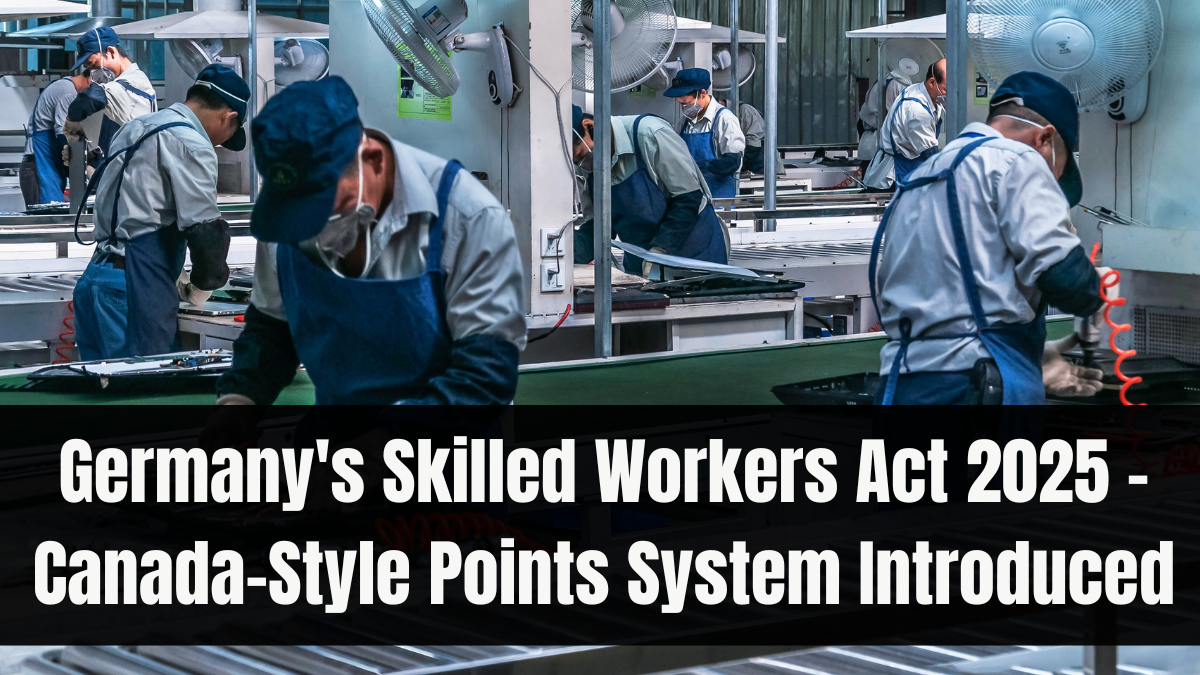In a bold move to address labour shortages and modernize its migration framework, Germany has launched a Canada-style Points-Based Immigration system under its newly enacted Skilled Workers Act 2025. The reform is Germany’s most comprehensive update in decades, designed to streamline entry for skilled non-EU workers while ensuring economic alignment. With faster applications, transparent eligibility, and expanded job access, the Germany Points-Based Immigration model is attracting professionals from across the globe—including IT experts, healthcare professionals, engineers, and more.

What Is the Germany Skilled Workers Act 2025?
Passed in late 2024 and fully implemented from April 2025, the Skilled Workers Act (Fachkräfteeinwanderungsgesetz) introduces a structured points-based pathway for immigration. It combines:
-
Points allocation based on age, education, experience, language, and job offer
-
New “Opportunity Card (Chancenkarte)” for jobseekers without prior offer
-
Expanded recognition of foreign qualifications
-
Streamlined visa issuance and residence permit processes
The goal is to make Germany’s system more flexible and competitive—similar to Canada’s Express Entry or Australia’s SkillSelect.
How the New Points System Works
Under the Germany Points-Based Immigration system, applicants are assessed out of 100 points based on:
-
Education level (degree/diploma): up to 30 points
-
Work experience in a related field: up to 20 points
-
German or English proficiency: up to 15 points
-
Age (below 35 preferred): up to 10 points
-
Job offer in Germany: up to 20 points
-
Connection to Germany (prior study, visits): up to 5 points
A minimum of 60 points is needed to apply under the new Opportunity Card, which grants residence for up to 1 year to seek employment while living in Germany.
Key Benefits of the 2025 Reform
The 2025 Skilled Workers Act simplifies and accelerates skilled migration with:
-
No job offer required for Opportunity Card holders
-
Fast-track processing for qualified applicants—within 4–6 weeks
-
Recognition of international work experience in regulated and non-regulated fields
-
Greater access to non-academic skilled trades (e.g., electricians, caregivers)
-
Rights for family reunification and spousal work permits
These updates mark a major shift from Germany’s earlier employer-dependent system.
Target Sectors and Priority Occupations
Germany’s Points-Based Immigration system prioritizes sectors facing acute shortages, such as:
-
Healthcare – Nurses, radiologists, medical technicians
-
IT & Software Development – Developers, cybersecurity experts
-
Engineering – Civil, mechanical, and electrical engineers
-
Skilled trades – Carpenters, metalworkers, mechatronics specialists
-
Elder care and child care
The “Fast Lane Program” under the act provides direct support for foreign professionals in these categories, including credential recognition and job matching.
Digital Portal & Application Process
Germany now offers a fully digitized application portal, where applicants can:
-
Calculate eligibility points with an official online calculator
-
Upload and verify documents electronically
-
Book appointments and track visa progress in real-time
-
Access guides in multiple languages for document translation and validation
The centralized platform simplifies the immigration journey and reduces waiting times at German embassies and consulates.
FAQs
What is the Germany Skilled Workers Act 2025?
It is a comprehensive immigration law introducing a points-based system to attract skilled workers from non-EU countries.
Do I need a job offer to apply for a visa?
Not necessarily. You can apply for the Opportunity Card with 60+ points, which allows you to search for a job while in Germany.
How fast is the visa process under the new law?
Fast-track categories now see processing in 4–6 weeks, especially in high-demand occupations.
What sectors are prioritized under the new system?
Healthcare, IT, engineering, skilled trades, and eldercare are among the sectors given top priority.
Can I bring my family with me?
Yes. The law allows family reunification and even grants work rights to spouses of skilled migrants.
Click here to know more.
